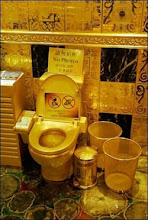
Stop all the clocks, cut off the telephone. The Golden Latrine has taken to his Anderson shelter and advises you all to do the same, for today the apocalypse has hit. Yes, that's right, Wikipedia is down for the day.
This seemingly minor inconvenience will hit the journalistic profession with the force of a meteor strike. Forget all the other issues bedevilling the profession - the Murdochs, phone-hacking, the loss of advertising revenues, dishonest journalists - this is, as political types like to say, a game changer.
Newsrooms across the globe will come to a standstill. Puzzled journalists are, right now, sitting and scratch their heads, starring bereftly at their half-eaten sandwiches, wondering where the hell they are going to find out the GDP of Gambia, that actress's credits or an explanation of a basic scientific concept. It's almost as if they're going to have to start doing genuine research.
But there is a serious point behind Wikipedia's temporary snooze. Their 24-hour blackout has been decided upon by their community to protest against the Stop Online Piracy Act (SOPA) in the U.S. House of Representatives, and the Protect Intellectual Property Act (PIPA) in the U.S. Senate. Anyone trying to log on will be confronted with this:

There is a reasonably clear explanation of the two bills here on the BBC website. Essentially they are entertainment industry-backed bills designed to crack down on music and film piracy and illegal downloading. And the punishments they are looking to impose are suitable draconian: anyone found guilty of streaming copyrighted content without permission 10 or more times within six months may face up to five years in jail.
The recent case of Sheffield-based Richard O'Dwyer, the 23-year-old student threatened with extradition to the U.S. for running TV Shack, a site linking to pirated TV shows, proves that simply not being a U.S. citizen isn't going to save you. Those free South Park episodes may soon be a thing of the past.
The two bills also ban advertisers/search engines from linking to file-sharing sites, effectively rendering them invisible. So why are Wikipedia (and other internet giants like Google, Yahoo! and Facebook) so strongly against these bills? Well, you can read Wikipedia's full statement here, but it boils down to the fact that the wording of the bills is so open-ended that if passed it would be, in their words, "devastating to the free and open web". The battle for the internet has well and truly begun.
Is Wikipedia accurate?
When Wikipedia announced the blackout, there was a lot of snarky online comments along the lines of "Quick, we'd better stockpile inaccurate information". Amusing, yes, but research has continually shown that the myth of Wikipedia's inaccuracy is just that, a myth. A 2010 study showed that cancer information on Wikipedia was just as accurate (if less well-written) than on the National Cancer Institute’s peer-reviwed Physician Data Query.
EDIT: For anyone still puzzled, I've just found this nice little animation on the Guardian website which clearly explains SOPA.


No comments:
Post a Comment